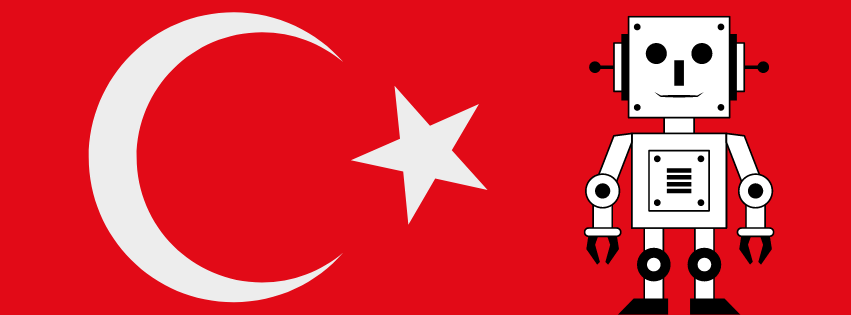Türkiye has been making significant strides in the realm of artificial intelligence (AI), with numerous initiatives aimed at fostering innovation, ensuring ethical AI practices, and enhancing international collaboration. These efforts, overseen by various governmental bodies such as the Ministry of Industry and Technology (MoIT) and the Presidency of the Republic of Turkey Digital Transformation Office, highlight Türkiye’s commitment to positioning itself as a leader in AI technology.
Since 2019, the Scientific and Technological Research Council of Turkey (TÜBİTAK) and the Ministry of Industry and Technology (MoIT) have been providing R&D support for various AI sub-areas and sectoral implementation in sectors like ICT, health, and automotive. TÜBİTAK is developing a technology roadmap for AI, which includes priority areas, technologies, and products to be developed to achieve determined R&D targets.
In 2019, the Assembly of Turkish Scientists Abroad, managed by MoIT, the Turkish Academy of Sciences (TÜBA), and TÜBİTAK, included a focus group study on AI. The assembly aims to foster STI cooperation among Turkish scientists in Turkey and abroad, highlighting global and national trends in AI. The objectives include promoting collaboration among Turkish scientists worldwide and identifying trends and challenges in AI through focus group studies.
Initiated in 2020 by the Ministry of Industry and Technology (MoIT), the Turkish Natural Language Processing Project aims to create user-friendly and high-performance libraries and data sets required for processing Turkish texts. This project focuses on establishing the distribution infrastructure of clusters and providing the necessary data and tools. The objectives include collecting text data, organizing existing data, labeling and creating tools, editing libraries and language models for the Turkish language, and processing audio.
The Turkish Brain Project, started in 2020, is managed by the Presidency of the Republic of Turkey Digital Transformation Office. This project aims to serve as a decision support system by offering AI algorithms to support various medical practices in Turkey. The primary objective is to examine MRI scans of patients with brain tumors to create and train a classification system using AI algorithms.
Starting in 2020, the Humane AI Net project involves Türkiye as a partner, with the participation of TÜBİTAK. The project brings together top European research centers, universities, and key industrial players into a network of centers of excellence.
Initiated in 2020, the Breast Cancer Detection with AI project is managed by the Presidency of the Republic of Turkey Digital Transformation Office. The project involves labeling benign and malignant anomalies in mammography images by radiologists using a developed labeling tool. AI models will be developed with open-source data sets to minimize errors in mammography screening and prioritize the examination of risky images by radiologists. The project aims to serve as a decision support system in the intense work processes of radiologists and increase the likelihood of early diagnosis and saving lives in Turkey.
The National Artificial Intelligence Strategy, prepared in line with the Eleventh Development Plan and the Presidential Annual Programs, outlines the measures to advance Türkiye’s work in AI from 2021 to 2025. This strategy include training AI experts and increasing employment, supporting research, entrepreneurship, and innovation, facilitating access to quality data and technical infrastructure, regulating to accelerate socioeconomic adaptation, strengthening international cooperation, and accelerating structural and labor transformation.
In 2022, the Ministry of Industry and Technology (MoIT) and the Turkish Standards Institution (TSE) began working on developing a trust stamp to indicate that trustworthy AI is used in AI-enabled products, enhancing customer trust. This initiative involves determining criteria and metrics through expert group meetings and methodology determination activities, examining international studies. Launched in 2022, the Digital Youth Artificial Intelligence Ecosystem, overseen by the Presidency of the Republic of Turkey Digital Transformation Office, aims to unite student clubs related to AI at universities affiliated with YÖK. The initiative supports the development of a qualified workforce in AI fields through practice-based training, competitions, and post-training career awards.
In 2022, Türkiye became a member of the Global Partnership on Artificial Intelligence (GPAI) during the Tokyo Summit held on 21 and 22 November. The Ministry of Industry and Technology (MoIT) is responsible for this membership. The GPAI is a multi-stakeholder initiative designed to bridge the gap between AI theory and practice by supporting cutting-edge research and applied activities on AI-related priorities. Built around a shared commitment to the OECD Recommendation on Artificial Intelligence, GPAI unites engaged minds and expertise from science, industry, civil society, governments, international organizations, and academia to foster international cooperation.
Launched in 2022, the Artificial Intelligence Ecosystem Call 2023 is managed by MoIT and TÜBİTAK. This support model facilitates collaboration between companies seeking AI solutions and relevant stakeholders. It encourages companies to form consortia comprising a technology provider, a university research laboratory/center, or a public research center/institute with AI expertise, and the TÜBİTAK Artificial Intelligence Institute.
The AI Mirror Committee, established in 2022, is managed by MoIT and the Turkish Standards Institution (TSE). The committee works on developing standards and metrics for trustworthy AI, fostering transparency, robustness, security, and accountability in AI applications. The initiative involves expert group meetings, methodology determination activities, and examining international studies to establish comprehensive criteria for trustworthy AI. The objectives include promoting the development and adoption of trustworthy AI standards, ensuring transparency in AI applications, and fostering consumer trust in AI-enabled products.

